- Acute Stroke Unit
- Ambulatory Oncology Treatment
- Breast Care Center
- Cardiac Catheterization Lab
- Child Development Unit
- Clinical Neurophysiology Lab
- Computed Tomography / CT Scan
- Diabetic Foot & Wound Center
- Dialysis Center
- Ear, Nose & Throat Center
- Emergency Unit 24/7
- Endoscopy Unit
- Eye Center
- Labor or Birthing Room
- Magnetic Resonance Imaging
- Minimally Invasive Surgery
- Non-Invasive Cardio Lab
- Nuclear Medicine
- OB Sonology / OB Ultrasound
- Center for Respiratory Medicine
- Sleep Center
- Skin Center
- Stone Center
- Vitality Center
Clinic Schedule:

Vitality Center
Our Stroke Unit offers the latest, most advanced stroke care in a highly specialized environment. We employ a comprehensive, multifaceted approach to make sure that patients receive the right care and intervention at the right time, and all care is delivered by experienced medical experts compassionately and in a personalized setting.
The Unit, in tandem with the Emergency Unit, is trained to recognize the signs of stroke and implement swift response. We have a neurologist on call 24/7 to guide treatment of stroke patients. Once a person is identified as a potential stroke patient, a CT scan or MRI is performed to determine the type and the best course of treatment going forward.
Services Offered:
- Onset
Often, clot-busting drugs can dissolve blood clots and successfully restore blood flow to the brain. Whenever additional intervention is required, our top team of neurologists, surgeons, and cardiologists use the latest minimally invasive techniques and procedures to restore and improve blood flow. If a blockage in the carotid artery is detected, our Catheterization Laboratory (Cath Lab) offers an invasive stenting procedure to clear the blockage and reduce risk of stroke.
If the time of onset is less than four-and-a-half hours, the patient might be eligible for a clot-buster drug called TPA or tissue plasminogen activator, a drug that will dissolve the existing clot and restore blood flow to the affected area of the brain. The patient must meet certain criteria to receive this drug, including:
- No history of trauma or surgery within the last three months
- PT/INR blood levels (coagulation studies) must be within defined parameters to reduce the risk of bleeding
- Benefits outweigh the risks
- No history of brain tumor, aneurysms or recent stroke
- Blood sugar level between 60 and 400mg/dl
- Older than 18 years old
- Patient and family consent
- Peri-and-Post Stroke Care
The CMC Stroke Unit also provides outstanding care for patients during and after a stroke. Our diagnostic tests help us determine the exact cause of the stroke. If we know what kind of stroke a patient has experienced, we can help prevent another stroke and educate patients and families regarding:
- Risk factors
- Lifestyle changes
- Signs and symptoms of a stroke
- When to getting to the hospital
Did You Know?
- Numbness or weakness of the face, arm, or leg, especially on one side of the body
- Confusion, trouble speaking, or understanding
- Trouble seeing in one or both eyes
- Trouble walking, dizziness, loss of balance, or coordination
- Severe headache with no known cause
Team of Doctors
Cardiologists:
- Dr. Rosella Arellano
- Dr. Joselito Atabug
- Dr. Jennifer Cantre
- Dr. Joseph Cuaresma
- Dr. Noel Maninang
- Dr. Joel Paz
- Dr. Ceasar Quiambao
- Dr. Jennifer Cantre
- Dr. Mark So
Team of Doctors
Interventional Cardiologists:
- Dr. Vergel Quiogue
- Dr. Ramoncito Tria
- Dr. Mario Villardo
- Dr. Emmanuel Rebollido
- Dr. Liberty Yaneza
- Dr. Mark Gavin Garcia
Team of Doctors
Cardiology Fellows:
- Dr. Julien Torio
- Dr. Clarina Marcelino
- Dr. Genesis Del Rosario
- Dr. Paul Ines
Team of Doctors
Cardiothoracic Surgeons:
- Dr. Eden Gabriel
- Dr. Gadys Ruth David
- Dr. Nelson Lee
Team of Doctors
Interventional Radiologists:
- Dr. Alfred Madamba
- Dr. Renato Carlos
- Dr. Victor Irwin Jocson
Team of Doctors
Interventional Neurologist:
- Dr. Dan Neftalie Juangco

